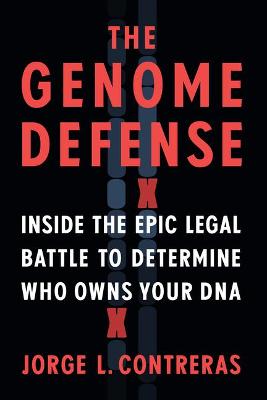
In this riveting, behind-the-scenes courtroom drama, a brilliant legal team battles corporate greed and government overreach for our fundamental right to control our genes.
When Chris Hansen, an ACLU lawyer, learned that the US government was issuing patents for human genes to biotech companies, his first thought was: How can a corporation own what makes us who we are? Then he discovered that women were being charged exorbitant fees to test for hereditary breast and ovarian cancer--all because Myriad Genetics had patented the famous BRCA genes. So he sued them. The Genome Defense gives us a front-row seat as Hansen and a team of ACLU lawyers, along with a committed group of activists, scientists, and physicians, take their one-in-a-million case all the way to the US Supreme Court. Jorge L. Contreras, an attorney at the forefront of genetics law, interviews more than a hundred key players as he lays out the groundbreaking legal strategy to challenge human gene patents. The culmination of years of work, his book is both an intimate look at the cancer survivors whose lives have been affected by this case and a sweeping investigation into the fallout from our technological age of discovery.
Like The Immortal Life of Henrietta Lacks, The Genome Defense is a powerful and compelling story about how society struggles to balance scientific advancement, corporate profits, and the rights of all people.
Dense Yet Enlightening. If you're like me and don't like taking books across into a new month, I do *not* recommend trying to read this on the last day of the month while still working or having virtually any other obligation. Though its bibliography is a touch low at just 17% of this advanced copy (and it has numerous problems, at least in this form, of saying something like "the industry spent $ billions of dollars" without actually giving the number - a problem I've never noted before in any other such text), much of the reason for that is that the author himself conducted so many interviews and consulted the public court records so much, so at least there is that on that particular point. Beyond its sourcing though, this is truly a fascinating yet *dense* look at the particular issue of the AMP v Myriad patent lawsuit that eventually became a landmark Supreme Court of the United States case, detailing its full history and the personnel involved, at least insofar as their personal involvement with the case goes. (Vs other similar books looking at a particular issue like this, where full biographies of the personnel are given. Here, just enough biography is given to establish who this person is within context of this issue and their motivations surrounding it, without giving their full life stories outside of events connected to this exact case.) You may say to yourself "this is just 350 or so effective pages, that is an easy day's read". IT. IS. NOT. I cannot reiterate enough just how dense (yet truly readable and fascinating) this book is. Almost as though it seems to try to pack in double the amount of words of a book of similar length. Still, it is truly compelling, truly comprehensive, and truly well written, and for this it is very much recommended.
Reading updates
-
Started reading
-
30 September, 2021:
Finished reading
-
30 September, 2021:
Reviewed
